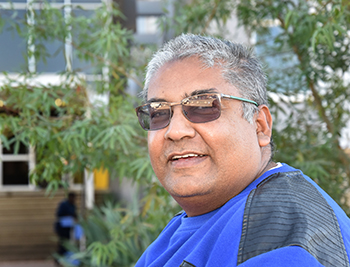Latest News Archive
Please select Category, Year, and then Month to display items
24 July 2024
|
Story Lacea Loader
![]()
The University of the Free State (UFS) is co-hosting the Global Social Innovation Indaba together with Social Innovation Exchange (SIX) on its Bloemfontein Campus from 30 September to 2 October 2024. This event brings together people from different sectors all over the world to discuss how to accelerate and support people-powered
change and create a better society for generations to come.
The UFS is excited to collaborate with SIX, as its vision and values overlap. During this three-day indaba, aspects such as – what it takes to build accountable, inclusive, and participatory institutions, specifically the future role of universities in South Africa – will be discussed. Themes to be explored include young people as drivers of change, post-industrial transitions and community resilience, the role of art, social change and bridging divides, and systemic approaches to dealing with unemployment.
Some of the speakers and participants in the programme include Carla Duprat from ICE (Brazil); Cheryl Jacob from ESquared Investments (South Africa); François Bonnici from the Schwab Foundation for Social Entrepreneurship (Switzerland); Sir Geoff Mulgan from the University College London (UCL) in the United Kingdom; and Dr Narissa Ramdhani from the Ifa Lethu Foundation (South Africa).
The UFS will also use the opportunity to showcase its campus and offerings to attendees, focusing on its transformation story and some of the interdisciplinary forward-thinking programmes. Guests will also be treated to true South African hospitality, laying the foundation for strong relationships and collaboration.
SIX believes in the transformative power of people working together. Exchanges based on mutual value and reciprocity are the missing link in tackling the world’s problems. As a friendly, expert entry point to global social innovation, their work connects organisations, sectors, communities, and nations to build capabilities and create opportunities for collaboration.
Prof Solomon appointed to board of flagship journal of UNECA
2016-10-06

Prof Hussein Solomon, member of the Editorial
Board of the Afro-Arab Social and Economic
Review. He is also the author of Islamic State
and the Coming Global Confrontation.
Photo: Charl Devenish
“I cannot say I worked towards it – I just did my work, and I guess someone noticed.” These are the words of Prof Hussein Solomon from the Department of Political Studies and Governance at the University of the Free State (UFS), who was recently appointed to the Editorial Board of the Afro-Arab Social and Economic Review.
On an editorial board with people he quoted
This is the flagship journal of the United Nations Economic Commission for Africa (UNECA). The mandate of the Economic Commission for Africa (ECA) is to promote the economic and social development of the states which are regarded as members of the United Nations (UN). Prof Solomon says the board consists of people that he used to quote when he was a student, and to serve alongside them is a privilege.
Book launched in Greece, Japan, and Indonesia
His book, Islamic State and the Coming Global Confrontation, was earlier published by Palgrave Macmillan in London and launched in Greece, Japan, and Indonesia in June and July 2016 respectively. It analyses the origins and organisational structure of the Islamic State (IS), ans examines its military triumphs and success in securing new recruits via social media.
Exploit of IS vulnerabilities to combat organisation
Prof Solomon says the IS makes use of the winning hearts and mind (WHAM) principle where they earn the trust of residents by providing basic services, and the only solution we have is to “exploit the Islamic State’s vulnerabilities and to highlight their atrocities.”
He mentions that a lot needs to be done to overcome the IS. It is vital to have boots on the ground and an acceptance that countries will splinter. An overarching strategy needs to be in place which allows for regional variations, good governance, and the countering of extremism.